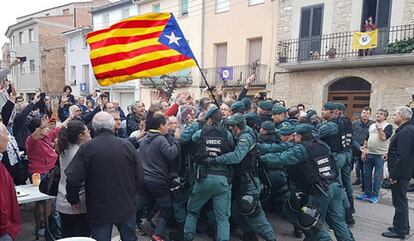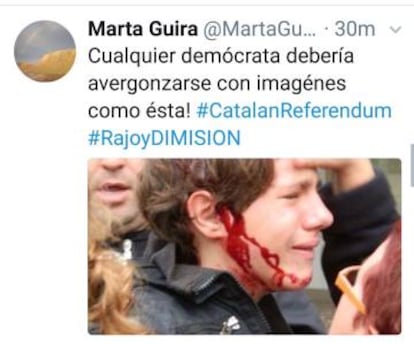There’s fake news in Catalonia too
With the circulation of exaggerations and biased reporting, the Catalan crisis has become a problem for the European Union
The network of social media profiles that helped propel Donald Trump to the US presidency, saw Brexit win through in Britain, and got extremist parties into power in France and Germany have successfully completed their first foray into southern Europe. From this Sunday, with the use of real and fake images and interpretations in line with the international views that prevail in Russia, the Catalan crisis has become a crisis of European democracy in ultra-nationalist and anti-globalization circles on the internet. According to tools from the national security advocacy group Alliance for Securing Democracy, the referendum has become the most-commented-on issue by these profiles.

After a month of intense activity, primarily on Twitter, these pro-Russian profiles have managed to successfully place the secessionist challenge among the most relevant issues in international politics on internet forums. But the issue has not been presented as a dispute between the majority of Catalans who want to decide on their independence and the rest of the Spanish people, but rather as a crucial part of a crisis in the model of Western democracy and the European Union as an institution. Officially, the Kremlin has stated time and again that the referendum is an internal Spanish affair. However, the accounts that less diplomatically promote the Russian government’s interests on social media spoke yesterday of the EU’s imminent decomposition.
One of the main accounts for the group of hackers, Anonymous, (@YourAnonNews, 1.7 million followers) spent a good part of the day commenting on the crisis and at 1pm sent a message that read “Democracy, or whatever is left of it in Europe,” and was accompanied by three images of people who were trying to vote and had been injured by police. The post received thousands of retweets.
Among the highlighted topics in the tweets from English-speaking pro-Russian accounts were not only words like “Catalonia” and “Catalan,” but also “Franco” and “Francoism.” The dominant hashtag throughout the day was “Catalan Referendum,” with a 7,500% increase in use.
In the tweets from pro-Russian accounts were not only words like “Catalonia” and “Catalan,” but also “Franco” and “Francoism”
These profiles often shared information from RT, the media outlet financed by the Kremlin, and which the American intelligence considers a propaganda arm for Russia. The RT article talks about the “use of batons and rubber bullets” and only tells the story from the side of Catalan regional premier, Carles Puigdemont. RT emphasizes that the security forces “create a terrible image of Spain” and describe the incidents as a fight between “the police and the Catalans,” in a generic way. The news source makes no mention of the division among Catalans over independence and of the rulings on the referendum made by the Spanish justice system ahead of Sunday.
RT has provided intense coverage of this crisis, with live images from polling stations as if the vote were a legitimate election with democratic guarantees. The Spanish edition of RT also dedicated many resources to covering the day with the headline of “Catalonia chooses its destiny,” as if it were a consensual and binding referendum.
The outlet often mentions Julian Assange, who usually shares RT’s news articles. Yesterday, the news source highlighted a message from the activist and founder of Wikileaks where he directly addressed the president of the European Commission, Jean Claude Juncker, and asked him to “suspend Spain from the European Union for its clear violation of Article 2” of the Treaty of Lisbon, which states that member countries must respect human rights.
Conspiracy theories
Alarmist messages like this one mixed with conspiracy theories is what has given wings to what is known as the alt-right in the US. Yesterday, some leaders of this radical movement lamented that Twitter shut down the account Voice of Europe (@V_of_Europe), a pseudo-media source that has been dedicated to promoting Russia’s interests in Brussels. “Let's talk about meddling in democracy. Twitter just shut down Voice of Europe in the middle of the night just before the Catalonia independence vote began. Let that sink in,” wrote Jack Posobiec (@JackPosobiec, 205,000 followers), an extremist provocateur who has been retweeted by Trump himself.
The American extreme-right news outlets, such as InfoWars and The Drudge Report, have run with the story of the crisis for several days now. Yesterday, Breitbart News, the source known for supporting the alt-right and Trump’s rise to power, also commented on the issue with its article: “Spain violently suppressing vote which runs counter to the goals and ideal of the EU.” The latter part of that statement cannot be interpreted as being positive, given that the same source refers to leaders of the EU as having been “chosen by no one.”
The perspective of this amalgam of anti-globalization, libertarian, nationalist and anti-Western leaders was expressed yesterday by Brendan O’Neill, an editor of another of their preferred media outlets, Spiked Online, which was cited as such by Brietbart: “In Spain, the powers-that-be seek to crush popular sentiment before it is even expressed. In Britain they try to crush it after it is expressed. Remoaners should look with horror and shame on this photo of a Spanish riot police officer physically removing a ballot box so that Catalan voters cannot have their say in the independence referendum, for it is only a rougher, more honest version of what they have been trying to do to our independence vote for the past 16 months. Hurry it away, silence it, pretent it never happend, shut the plebs up. Across Europe, elites no longer take the views of citizens seriously – this is the great outrage of our times.”
Yesterday those profiles jumped on any indication that EU leaders were in disagreement over Catalonia. British Labor leader Jeremy Corbyn’s call on Prime Minister Theresa May to request that Spanish Prime Minister Mariano Rajoy end the violence became one of the most-shared tweets of the day. In the middle of the afternoon, a good part of the Spanish and foreign media, including RT, rushed to publish the news that the German chancellor, Angela Merkel, had called Rajoy after learning that the number of injured surpassed 400. The information, which immediately went viral, turned out to be false, and was the result of a mistake by a journalist for the German newspaper Die Welt.
Foto de Pulitzer. Ho sento, no se qui és l'autor... pic.twitter.com/RAFHGYiumH
— Josep M. Mainat (@MainatJM) October 1, 2017
The edited image shared as a “Pulitzer photo”
Adding flags
This movement of interference not only seeks to inflate with exaggerations and false and biased news. It also feeds on epic images, in the hopes of going viral and becoming symbols. Taking advantage of the recent controversy between Trump and the players of the National Football League who took a knee in protest against racism during the national anthem, these fake news networks spread the hoax story that one of these athletes had burned an American flag.
Flags are important symbols in these types of exaggerations and falsehoods, and the case of Catalan independence is no exception. Josep Maria Mainat, a member of the La Trinca band, shared a retouched photo to his 75,4000 followers on Twitter. It showed a struggle between Civil Guard agents and a group of citizens, where a Catalan independence flag was digitally added.

Several anonymous accounts shared a video on Twitter of police officers with riot gear hitting a defenseless young man, captioned “Spanish police attack Catalan voter.” The posts received thousands of retweets within hours. But in reality, the incident took place on November 14, 2012. The photo of the injured boy was shared alongside real photos of people who were wounded yesterday. Photos of police during a mining disturbance in July were also passed off as from the day of the referendum.
English version by Debora Almeida.
Tu suscripción se está usando en otro dispositivo
¿Quieres añadir otro usuario a tu suscripción?
Si continúas leyendo en este dispositivo, no se podrá leer en el otro.
FlechaTu suscripción se está usando en otro dispositivo y solo puedes acceder a EL PAÍS desde un dispositivo a la vez.
Si quieres compartir tu cuenta, cambia tu suscripción a la modalidad Premium, así podrás añadir otro usuario. Cada uno accederá con su propia cuenta de email, lo que os permitirá personalizar vuestra experiencia en EL PAÍS.
¿Tienes una suscripción de empresa? Accede aquí para contratar más cuentas.
En el caso de no saber quién está usando tu cuenta, te recomendamos cambiar tu contraseña aquí.
Si decides continuar compartiendo tu cuenta, este mensaje se mostrará en tu dispositivo y en el de la otra persona que está usando tu cuenta de forma indefinida, afectando a tu experiencia de lectura. Puedes consultar aquí los términos y condiciones de la suscripción digital.








































